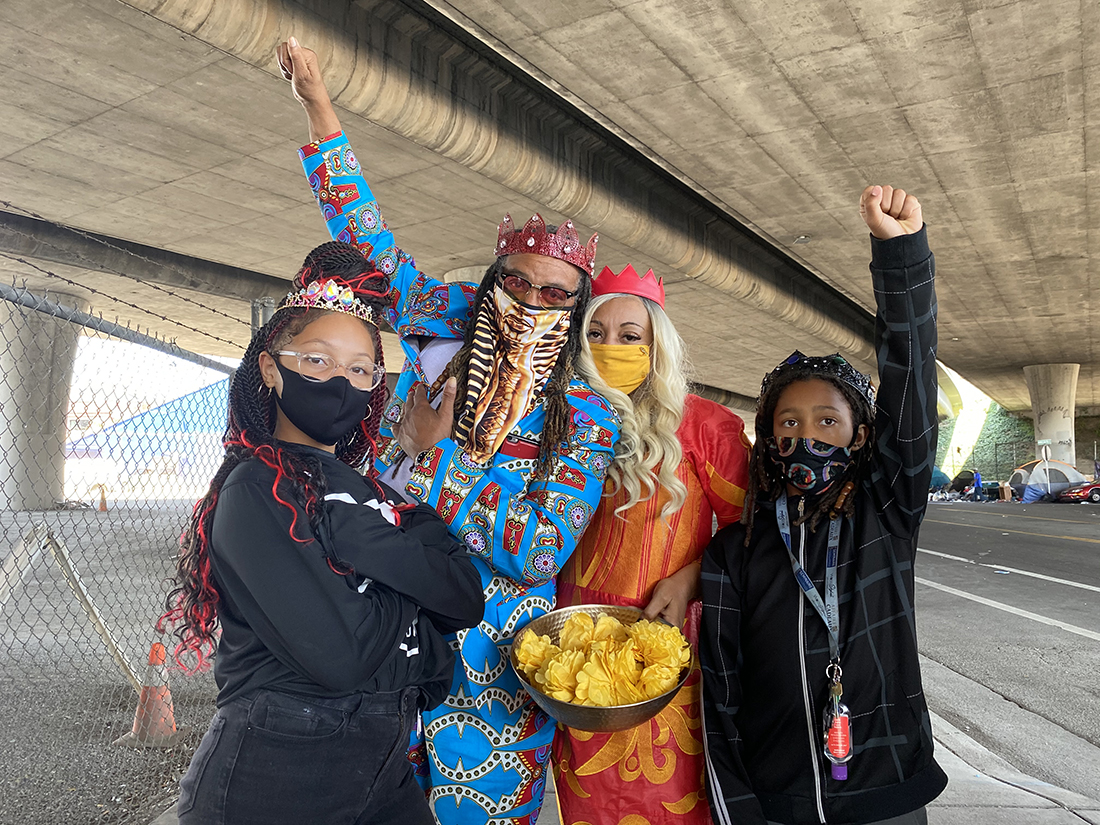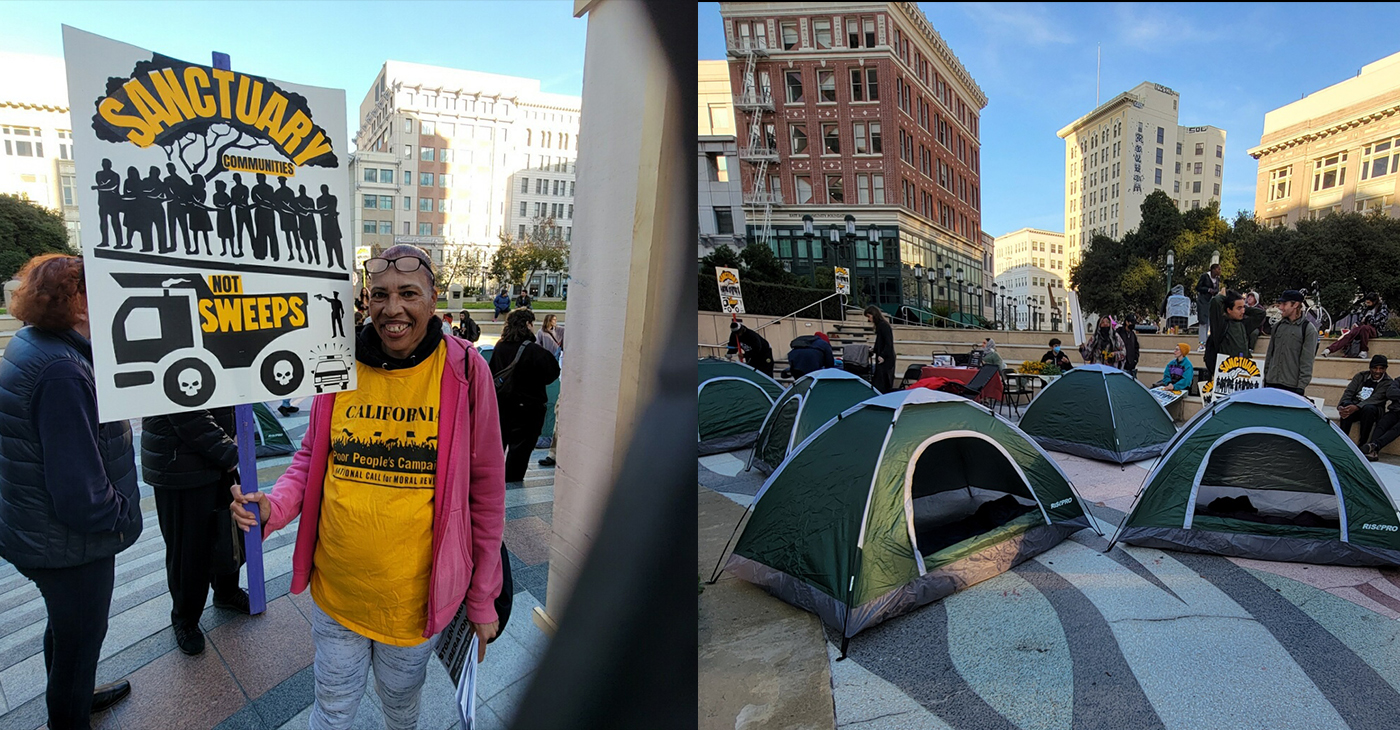Activism
Breaking Chains for Change – One Family’s Fellowship to Empower Communities

Wearing their crowns together, the Smith family say they are affectionately known as “The Bay Area Royal Family,” doing fellowship and inviting families to learn, grow and heal with each other on Oakland’s streets through their project, the Broken Chains Empowerment Center.
With their four children—Tiana Essence, Fabulous, Fantastic and Mr. Famous Finesse—Street Rev. “Frank The Blessed” Smith and Lady Tapatha Kendrick Smith seek to empower the next generations for growth in ways they did not have for themselves in the past.
Through Broken Chains Empowerment, the family is dedicated to feeding homeless people from Oakland to Sacramento. When the Smiths station themselves in Oakland at West Grand and Martin Luther King Jr. Way, they usually feed an average of 150-200 people. They have been known to feed the homeless on such a regular basis, their youngest children Fantastic (12-years-old) and Mr. Famous (10-years-old) said it is ingrained as a part of the duties they will continue on for the rest of their lives.

Both Frank and Tapatha are ordained through deliverance ministry—the Christian faith that performs purifying rituals to remove demons and evil spirits that are believed to be attributed to physical, mental, spiritual, and emotional issues within people’s lives.
Since starting the Broken Chains Empowerment Center, they have developed strong partnerships with Paramount Films, Parent Voices of Oakland, and Roses in Concrete. They have also worked with Choices For Freedom for the last eight years.
The Smiths have worked directly with youth centers, advocating to empower men and women and deliver certified training in human and sex trafficking awareness. They offer empowerment workshops to corporations, non-profits and individuals that bridge the gap of understanding between the upper class and the needs of the streets.
The COVID-19 pandemic has put a temporary halt on some of these activities, but it has not stopped them from doing their work locally in safe capacities.
Frank Smith is a licensed caterer and has a catering business called Holy Smokers in the Bay Area which has connected with several restaurants and church facilities in order to access high standard kitchens with food safety awareness, facilities he uses to also put together meals for the homeless.

“Frank The Blessed” Smith and Lady Tapatha Kendrick Smith cheer as a group of about 50 young skateboarders, bicyclists, and roller skaters pass by them on Broadway in Oakland with protests signs for Black Lives Matter on July 10. Photo by Michelle Snider.
Frank’s story
Frank Smith was born in San Francisco and moved to Oakland in the ’70s. He earned the name ‘Frank the Bank’ from his peers by the 10th grade because he was always finding ways to get money, eventually accepting an invitation from two women who asked him to be their pimp when he was 14-years-old.
Raised in a Christian home, the drive to care for himself and his mother as well as the influence of Blaxploitation movies like “The Mack” and “Sugar Hill,” made becoming a pimp at a young age appealing. “We didn’t know in our community that movies like that was empowering us to do death to ourselves,” he said.
Not only did Frank Smith take care of his own family, at a young age he paid for groceries for single moms and their children’s school pictures. “Because I had no man in the house I always felt like I was the one to carry the underdogs,” he said. “I didn’t understand it back then, but I also suffered from a spirit of rejection.”
Eight years ago he “came back home” to his faith and changed his name to ‘Frank the Blessed,’ although he is still fondly remembered by many in Oakland as ‘Frank the Bank.’
“My life has been spared. I’ve been through 13 different prisons, nine different county jails in a five-year course,” he said. From the age of 22 to 27, he was locked up. There were five attempts on his life, two of which he said he knew the prison guards were involved.
“I’ve seen things I don’t care to see again,” he said.
Through it all he could feel his grandmother praying over him, protecting him. He said, “I know that there’s a greater spirit than what my hands can touch, see or feel, and when the Holy Spirit asked me ‘Will I wear the crown to be ridiculed?’” he decided to follow in the footsteps of Jesus, whom he calls Ashur, who fed and healed the people.
Having a vision at five in the morning, Frank Smith realized that Tapatha Smith was meant to be his wife. He went to see her when she was passing out food to the homeless and asked her to marry him.
Speaking of his wife, Tapatha, he said, “She’s allowed the king in me to rise up.”
Tapatha’s story
Tapatha Smith was born in San Diego. Her family moved to the Bay Area when she was in third grade and she was raised in Fremont. Tapatha grew up in a deliverance ministry. Her mom, Dr. Evangelista, is a world pastor.
After traveling to Germany and working for the federal government for over a year, Tapatha Smith came back to the Bay Area and started working with tech company Apple in 1989. She worked her way up from building computers to becoming a process engineer. Over the years, the heavy workload turned her into a workaholic.
Eventually, her thyroid stopped functioning properly and she needed to improve her health. She attributes many women’s health failures to being overworked, in part due to patriarchal social structures. “Why? Because we’re being the husband, wife, we are having to juggle so much we are blowing our thyroid out,” she said.
Because of Tapatha Smith’s issues with her thyroid, at the time she met Frank Smith she was not looking to be married. She was able to present herself as a healthy person in public, but she often hid her poor health and would need to retreat home to recover.
When Tapatha first met Frank, she said she watched and observed Frank for 30 days at the locations where he and his children fed homeless. What really stopped her in her tracks was his unique appearance. “He just looked like this giant, rugged king,” she said. Even before he was wearing a crown she could see his crown.
She said she had always seen herself as a queen. One day, she saw Frank helping a lot of men, and she thought that was powerful — that he was not just feeding them but calling upon men to hear an uplifting message. She also saw there were a lot of women that needed help which inspired her to present an uplifting message for women as well.
“For me, understanding that the family structure is so broken now, I believe it starts with God the Creator, man, the woman and the children,” she said. “It stopped me in my tracks to listen to him.”
When Frank asked her to marry him, she made him wait patiently 40 days and 40 nights — until they married on May 1, 2017 — to consummate their union. They both agreed their partnership was deeper than physical attraction alone and needed time to harmonize.
The Family
Before meeting Tapatha, Frank said he had experienced homelessness as a single father for two-and-half years and struggled with being turned down by housing programs. When Frank introduced Tapatha to his four children, Tapatha embraced them as her own, and the children embraced her as their mother. A sense of stability formed into a family unity that now works together.
The Smiths’ parenting style is one of strict discipline that can be followed with rewards. They encourage their youngest daughter, Fantastic, and son, Mr. Famous, to be different and find themselves, teaching them that being different is valuable. Screen time on phones is limited while educational, community work and personal spiritual growth fill their busy schedules daily.
On their organization’s website Feet2DaStreet.org, Lady Tapatha says, “Each of us started at a young age as students of the Gospel with a praying and Christian upbringing. Yet our personal choices took us on completely opposite paths to our current situation. I, Lady Tapatha, chose the church world and corporate America. Street Rev. selected to be a man of leisure, fast cars, women, and money. Both paths led us to lifestyles that caused great pain, forcing this man and this woman to review our lives and fight for HEALING and CHANGE.”
Activism
Living His Legacy: The Late Oscar Wright’s “Village” Vows to Inherit Activist’s Commitment to Education
Kingmakers of Oakland (KOO), a nonprofit organization that works to improve educational and life outcomes for Black boys and men, stated that “Oscar Wright is one of the most prolific, consistent, and committed advocates of equity for Black students and Black Families here in Oakland for the past six decades.”

By Antonio Ray Harvey, California Black Media
Activists mourning Oscar Carl Wright’s death, have pledged to continue his lifelong mission of advocating for Black students and families in Northern California.
Wright, 101, who passed away on Nov. 18, was involved in Oakland’s educational affairs until his death.
Now, friends and admirers acknowledge that carrying on his legacy means doubling down on the unfinished work that Wright dedicated his life, time, and resources to, according to Y’Anad Burrell, a family friend and founder of San Francisco-based Glass House Communications (GHC).
“Mr. Wright did a lot of work around equity, specifically, for Black students based on their needs — whether it was tutoring, passing classes, or graduating,” Burrell said.
Wright became a champion for his children’s education, recognizing the disparities between their school experiences and his own upbringing in the Mississippi Delta.
Burrell told California Black Media (CBM) that the crisis of unequal access to resources and a quality education continues to affect the Oakland Unified School District (OUSD).
According to Oakland Reach, in the city of Oakland, only 3 in 10 Black and Brown students are reading at or above grade level. In addition, only 1 in 10 are doing math at or above grade level.
Oakland REACH is a parent-run, parent-led organization. It aims to empowers families from the most underserved communities to demand high-quality schools for their children.
Wright’s work as an activist had impact across the state but he was primarily known in the Bay Area. Alongside the Black United Front for Educational Reform (BUFER), he filed a complaint against OUSD for violating the Civil Rights Act of 1964.
In 2000, the OUSD school board proposed an action plan to address educational inequity, but it was never implemented.
Wright later founded the African American Honor Roll Celebration at Acts Full Gospel Church, an award that recognizes Black students with a grade point average of 3.0 or better. Each year, more than 1,000 students are honored at this ceremony.
Kingmakers of Oakland (KOO), a nonprofit organization that works to improve educational and life outcomes for Black boys and men, stated that “Oscar Wright is one of the most prolific, consistent, and committed advocates of equity for Black students and Black Families here in Oakland for the past six decades.”
Burrell said that one of the main reasons Wright’s work was so essential for families and children in Oakland that is the direct relationship between acquiring a quality education and affording quality housing, maintaining food security, achieving mental wellness, and securing stable employment.
Wright was the child of sharecroppers from Coahoma County, Mississippi. He attended Alcorn State University, a Historically Black College and University (HBCU).
In the late 1950s, Wright and his family relocated to the Bay Area where he worked as a contractor and civil engineer. He later became an active member of the National Association for the Advancement of Colored People (NAACP).
Burrell said the people who will carry on Wright’s work are part of a “village” that includes KOO’s CEO Chris Chatmon. Wright was a mentor to Chatmon.
“It will not be one entity, one person, or one organization that picks up the baton because it was a village effort that worked alongside Mr. Wright for all these years,” Burrell said.
Burell says that legacy will live on.
Activism
Protesters Gather in Oakland, Other City Halls, to Halt Encampment Sweeps
The coordinated protests on Tuesday in San Francisco, Oakland, Vallejo, Fresno, Los Angeles and Seattle, were hosted by Poor Magazine and Wood Street Commons, calling on cities to halt the sweeps and focus instead on building more housing.

By Post Staff
Houseless rights advocates gathered in Oakland, San Francisco, Los Angeles, and other city halls across California and Washington state this week protesting increased sweeps that followed a U.S. Supreme Court decision over the summer.
The coordinated protests on Tuesday in San Francisco, Oakland, Vallejo, Fresno, Los Angeles and Seattle, were hosted by Poor Magazine and Wood Street Commons, calling on cities to halt the sweeps and focus instead on building more housing.
“What we’re dealing with right now is a way to criminalize people who are dealing with poverty, who are not able to afford rent,” said rights advocate Junebug Kealoh, outside San Francisco City Hall.
“When someone is constantly swept, they are just shuffled and things get taken — it’s hard to stay on top of anything,” said Kealoh.
Local houseless advocates include Victoria King, who is a member of the coordinating committee of the California Poor People’s Campaign. She and Dr. Monica Cross co-chair the Laney Poor People’s Campaign.
The demonstrations came after a June Supreme Court ruling expanded local governments’ authority to fine and jail people for sleeping outside, even if no shelter is available. Gov. Gavin Newsom in California followed up with an order directing state agencies to crack down on encampments and urging local governments to do the same.
Fresno, Berkeley and a host of other cities implemented new rules, making it easier for local governments to clear sidewalk camps. In other cities, such as San Francisco, officials more aggressively enforced anti-camping laws already on the books.
Activism
Celebrating East Bay Leaders Keith Carson and Federal Glover at Geoffrey’s Inner Circle
Several leaders were in attendance including fellow Alameda Supervisors Elisa Marquez and Lena Tam, Superior Court judge-elect Terry Wiley, and African American Sports and Entertainment Group’s founder Ray Bobbitt, along with many other guests.

By Magaly Muñoz
After decades of public service in the East Bay, community members and leaders came together to celebrate Alameda County Supervisor Keith Carson and Contra Costa Supervisor Federal Glover at Geoffrey’s Inner Circle Thursday afternoon.
Several leaders were in attendance including fellow Alameda Supervisors Elisa Marquez and Lena Tam, Superior Court judge-elect Terry Wiley, and African American Sports and Entertainment Group’s founder Ray Bobbitt, along with many other guests.
First elected in 1992, Carson has served District 5 for 24 years and announced his decision to step away from his seat earlier this year, just before the deadline to submit new candidate applications.
He dedicated his long career to bringing access to health care, addressing homelessness, lowering crime, improving business retention, and growing job opportunities in Alameda County.
Glover began his tenure as Contra Costa Supervisor in 2000 and previously served as mayor of Pittsburg in 1998. During his time as Supervisor, he supported initiatives on public transportation, created committees for public safety, and supported task forces on health.
“These two distinguished leaders have dedicated their lives to improving the lives of so many people across Alameda and Contra Costa (counties). Their work has touched every corner of the East Bay,” Alameda County Supervisor and President Nate Miley said.
Leaders from both counties spoke on the supervisors’ legacies and their dedicated years of service.
Contra Costa Supervisor John Gioia said that Glover was the type of person that grew with each challenge that crossed him, especially after he had major surgery in 2020. But Gioia said that the treatment did not deter Glover.
“He’s had tougher races for reelection than any member of our board that I can recall, and he’s always come back stronger than before,” Gioia said.
Sharing a county border, Gioia complimented Carson on his ability to sway leaders from both sides of the political aisle to listen on the issues affecting locals and residents across the nation.
Shannell Scales Preston, who is taking over Glover’s D5 seat in 2025, told event attendees that Glover was a mentor to her for many years. He often would call Preston after Pittsburg City Council meetings with remarks about her performance and how well she spoke up on certain issues.
With Glover spending years as the only Black elected official in local government, Preston would ask him how he managed to not feel lonely about the job. She then congratulated him on being the only supervisor in Contra Costa to have all Black mayors under his district in 2023.
Preston said he’s been a leader to many diverse groups and his tenure has seen leaders of all backgrounds, but particularly paving the way for Black leaders in predominantly white areas.
Miley, who has shared his entire 24-year tenure on the Alameda Board with Carson, tearfully wished the exiting supervisor luck and said he would miss him dearly.
Carson said that as we embark on a “dark time” for everyone across the nation and worldwide in 2025, it’s important to continue communicating and working with groups from all backgrounds because that is the only way things will get done.
“There have been many lonely nights, but then the sun comes out in the morning when you continue to think, ‘I can make a difference,’” Carson said.
-

 California Black Media4 weeks ago
California Black Media4 weeks agoCalifornia to Offer $43.7 Million in Federal Grants to Combat Hate Crimes
-

 Black History4 weeks ago
Black History4 weeks agoEmeline King: A Trailblazer in the Automotive Industry
-

 California Black Media4 weeks ago
California Black Media4 weeks agoGov. Newsom Goes to Washington to Advocate for California Priorities
-

 Activism4 weeks ago
Activism4 weeks agoOakland Post: Week of November 27 – December 3, 2024
-

 California Black Media4 weeks ago
California Black Media4 weeks agoCalifornia Department of Aging Offers Free Resources for Family Caregivers in November
-

 Activism2 weeks ago
Activism2 weeks agoButler, Lee Celebrate Passage of Bill to Honor Congresswoman Shirley Chisholm with Congressional Gold Medal
-

 Activism2 weeks ago
Activism2 weeks agoPost News Group to Host Second Town Hall on Racism, Hate Crimes
-

 Activism2 weeks ago
Activism2 weeks agoDelta Sigma Theta Alumnae Chapters Host World AIDS Day Event












































